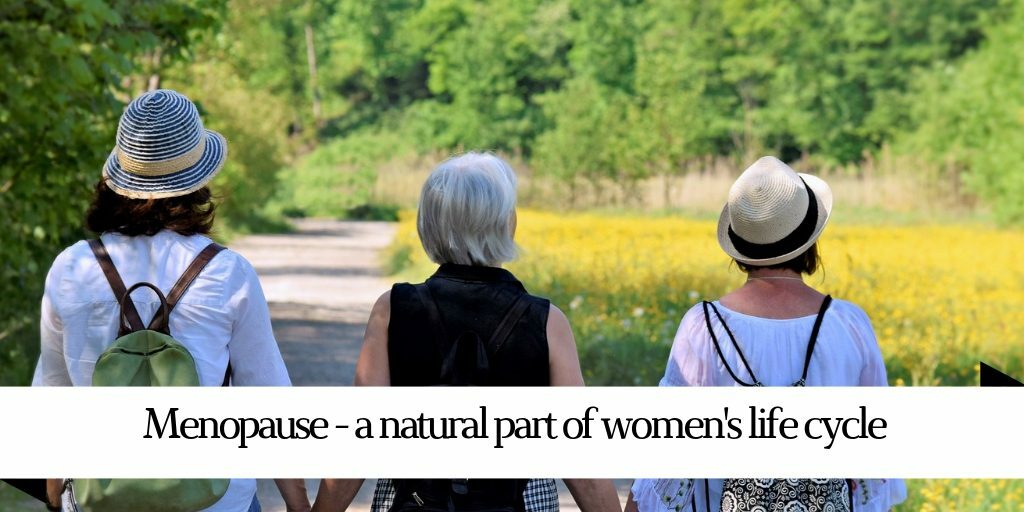Peri-menopause, Menopause and Beyond
The International Menopause Society, in collaboration with the World Health Organisation has designate 18th October as World Menopause Day. [Source: www.imsociety.org]
I’m 51 years young and peri-menopausal. The average age of Menopause (the term used for when a woman’s menstrual cycle has stopped for 12 months or more at mid-life or through medical intervention) in the UK is 51 years [Source: www.nhs.uk].
Like so many women these days I delayed motherhood and am still busy juggling parenting and the work life balance act! This is not uncommon as the average age of first time mothers in the UK is 30.3 years [Source: www.ons.gov.uk]. It’s been a difficult journey as I’ve needed to provide care for my aging parents, grandparents and in-laws, as well embark on parenthood. It has also resulted in a reduced support network that relies mainly on paid childcare and friends rather than family.
I always remember a work colleague, who was the only boy amongst several sibling sisters, joking that I could ‘look out’ when my children reached puberty as I’d be going through the menopause. This negative view of Menopause is far too common with a survey carried out by The British Menopause Society (B.M.S.) in 2017 identifying that more than half of women feel negative about their experience of menopause. The findings of this survey revealed a need for greater support for women experiencing the menopause across the UK. [Source: www.thebms.org.uk]
Thankfully, I’m happy to report the experience is quite remarkable so far – with a rapid increase in my confidence, self-esteem and overall wellbeing, so I feel quite passionate to share a positive message that ‘mid-life’ is, in the words of the late Leslie Kenton, a ‘Passage to Power’! This is also the title of one of forty books written by Leslie Kenton (1941-2016) who specialised in health and beauty.
Depending on your current age and circumstances you may know that your mothers, grandmothers continued to produce children until they reached menopause and ‘sailed’ through mid-life or were too busy to even notice! Those who did experience symptoms were often offered one course of action – a hysterectomy. The origin of the word Hysterectomy is, in my mind, quite demeaning to women at it originated from the Greek word Hysterikos “of the womb, suffering in the womb” and Latin term Hystericus, originally defined as a neurotic condition peculiar to women and thought to be caused by a dysfunction of the uterus. [Source: www.etymonline.com].
‘The Change’ as it was commonly referred to was a blanket-term used often as a label, with no real understanding or acknowledgment of the amazing impact Menopause has on women. Often women were, and are, just expected to ‘get on with it’! Older generations of women did just that and soldiered on regardless but in our modern Western societies Menopause seems to be viewed as an illness that needs to be medicated with HRT and/or antidepressants, alongside other medical intervention. Thankfully in recent years there appears to be a real positive shift in consciousness with Menopause being viewed in a more positive light and recognised as a natural part of women’s life cycle, which is how I certainly view it.
Common Symptoms
The common symptoms associated with Menopause according to the NHS website [Source: www.nhs.uk]:
- “Hot Flushes – short, sudden feelings of heat, usually in the face, neck and chest, which can make your skin red and sweaty.
- Night Sweats – hot flushes that occur at night.
- Difficulty Sleeping – this may make you feel tired and irritable during the day.
- Reduced Sex Drive (libido)
- Problems with Memory and Concentration
- Vaginal Dryness and pain, itching or discomfort during sex
- Headaches
- Mood Changes, such as low mood or anxiety
- Palpitations – heartbeats that suddenly become noticeable
- Joint Stiffness, aches and pains
- Reduced Muscle Mass
- Recurrent Urinary Tract Infections (UTIs)
- Weak Bones (Osteoporosis)”
Reading this list it’s hardly surprising the Menopause is viewed so negatively. Not all women will experience these symptoms at mid-life and there’s more information, support, treatment options, available than ever before. I’ve recently started attending a local Menopause Café, which is a wonderful forum for women experiencing this important time in their life journey to meet and chat about symptoms, coping mechanisms and what work’s for them. I intend to set up a Menopause Café locally starting January 2019 so watch this space for details if you are interested. [Source: www.menopausecafe.net].
Key Factors to my Positive Experience
I believe the key factors to my positive experience of the climacteric period so far are:
- Yoga
- Meditation
- Mindfulness
- Exercise that I enjoy
- Nutrition/Diet
- Homoeopathic Treatment
- Self-care and making myself, my needs, a priority for the first time in many years!
Leslie Kenton’s book ‘Passage to Power – Natural Menopause Revolution’
Dr Christiane Northrup ‘Women’s Bodies Women’s Wisdom – The Complete Guide To Women’s Health and Wellbeing’
Please don’t suffer in silence, make that move to get help if you need it, as there are more treatment options and increasing support systems in place than ever before. I’d also love to hear your stories of what is or has helped you through the Menopause.




